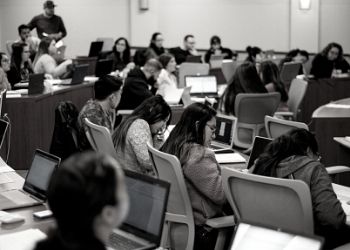Department of Marketing and Logistics
Department of Marketing and Logistics
Degree Options
Marketing is the process by which organizations define and select target markets, design products and services, set prices, determine distribution channels, develop social media & e-marketing campaigns, develop promotions, and design after-sale customer service. When all of these elements are correctly mixed, the firm is able to build long term relationships with its customers. Building on marketing theories and concepts, marketing students study the basics of marketing information systems. They also learn about exchanging relationships, personal communication, market segmentation, positioning strategies, Internet marketing, and marketing strategic planning. In addition, students can explore special interest areas such as promotion, retailing, international marketing, services marketing, logistics and supply chain strategies, social marketing media, sales management, distribution management, consumer behavior, and sports marketing. Particular emphasis is placed on marketing applications through experiential learning projects, service-learning experiences, simulations, hands-on projects with local companies, and semester long internships. Marketing is an exciting, fast-paced, dynamic field that offers career opportunities in e-marketing, marketing research, product design, retail and wholesale management, distribution, sales, sports marketing, sales management, purchasing, advertising and public relations, and marketing management. These exciting careers stimulate personal growth, challenge your creativity and imagination, and appeal to a variety of interests.
B.S. in Business Administration - Marketing Option Catalog Requirements
B.S. in Business Administration - Marketing Option Flowchart
Logistics is associated with the movement, storage and handling of materials and finished products. The option will also take into consideration the movement of agricultural commodities, fresh and processed foods and managerial and safety issues pertinent to transportation and storage of agricultural commodities. Logistics includes all of the activities focused on efficiently moving goods to the right place at the right time. Logistics has come to be regarded as a key determinant of business competitiveness. Companies are substantially improving their competitiveness and productivity by overhauling their internal logistics, and by more effectively managing their external links with suppliers and customers. The aim is to learn how to optimize the distribution of freight and freight-flow information from manufacturer to consumer, using advanced information systems and expertise to reduce inventories, cut transportation costs, speed delivery, and improve customer services. The current and long-term projected demand for logistics managers at all levels is very high. Currently the second largest employment sector in the United States. Logistics management offers everything that is expected in an ideal career including better than average salaries and advancement opportunities. The type of organizations which employ logistics managers include: manufacturing firms, wholesalers, distributors, service institutions, and transportations firms.
B.S. in Business Administration - Logistics & Supply Chain Strategies Option Catalog Requirements
B.S. in Business Administration - Logistics & Supply Chain Strategies Option Flowchart
The global sports industry is rapidly growing, and currently in the United States it represents more than $213 billion business, outpacing agriculture and motor vehicle sales combined, according to a recent survey. The US Sports Industry is far more than twice the size of the US auto industry, and according to ‘Sports Business Journal’, over 75% of the jobs being created in sports in the US is marketing-related.
B.S. in Business Administration - Sports Marketing Option Catalog Requirements
B.S. in Business Administration - Sports Marketing Option Flowchart
The Fashion Merchandising program focuses on preparing students for a wide variety of careers related to marketing, management, buying, and selling of fashion goods. It combines product and industry knowledge with business, communication, and computer skills. Job opportunities include buyers, merchandisers, store managers, product developers, and fashion consultants, as well as other positions in today's competitive and global environment. The curriculum is built upon the Mega Goals for Four-Year programs developed by the International Textile and Apparel Association (ITAA) and recommendations from fashion industry experts.
Eligibility
Certificates of special study are:
- Open to all business administration majors in any option, but only 6 units can double-count for credit for both one's major and the certificate.
- Open to all Fresno State students in any major and non-matriculated students (community members).
For successful completion of a certificate, students must receive a grade of C or better in each course.
Forms
Sign up for a certificate program
Apply for a certificate of completion
Certificate Programs
Required Courses (6 Units)
- FM 21 - Fashion Merchandising Fundamentals Units: 3
- FM 130E - Fashion Study Tours Units: 3
Elective Courses (Select 9 Units)
- FM 126 - History of Costume, from Ancient Sumerians to 1900 Units: 3
- FM 127 - Fashion Merchandising Units: 3
- FM 128 - Visual Merchandising Units: 3
- FM 133 - Textile/Apparel Economics Units: 3
Required Courses (19 Units)
- MKTG 100S - Marketing Concepts Units: 4
- MKTG 114 - Principles of Logistics and Supply Chain Units: 4
- MKTG 115 - Global Logistics and Supply Chain Strategies Units: 4
- MKTG 126 - Purchasing and Materials Management Units: 4
- MKTG 195I - Internship Units: 3
Required Courses (8 Units)
- MKTG 100S - Marketing Concepts Units: 4
- MKTG 160 - Professional Selling & Sales Force Management Units: 4
Elective Courses (Select 7-8 Units)
- MKTG 101 - Marketing Research Units: 4
- MKTG 110 - Consumer Behavior Units: 4
- MKTG 114 - Principles of Logistics and Supply Chain Units: 4
- MKTG 130 - Retail Managing and Merchandising Units: 4
- MKTG 132 - Promotion Mix: Principles and Practices Units: 4
- MKTG 134 - Entrepreneurial Marketing Units: 4
- MKTG 140 - Global Marketing Units: 4
- MKTG 144 - Services Marketing Units: 4
- MKTG 150 - Sports Marketing Units: 3
- MKTG 153 - E-Marketing Technologies and Social Media Units: 4
- MKTG 188 - Strategic Planning in Marketing Units: 4
- Or approved MKTG 189T
Required Courses (15 Units)
- MKTG 100S - Marketing Concepts Units: 4
- MKTG 110 - Consumer Behavior Units: 4
- MKTG 150 - Sports Marketing Units: 3
- MKTG 161 - Sports Licensing, Sponsorship, and Promotion Units: 4
Elective Courses (Select 3-4 Units)
- BA 152E - Law for Entrepreneurs Units: 3
- BA 179 - Legal & Ethical Aspects of Sports Marketing Units: 3
- ECON 144 - Economics of Sports Units: 3
- ECON 150 - Labor Economics Units: 3
- MKTG 132 - Promotion Mix: Principles and Practices Units: 4
- MKTG 140 - Global Marketing Units: 4
- MKTG 195I - Internship Units: 3
- RA 150 - Sports and Entertainment Facility Management Units: 3
- RA 152 - Sports and Entertainment Facility Booking, Promotion and Box Office Operations Units: 3


